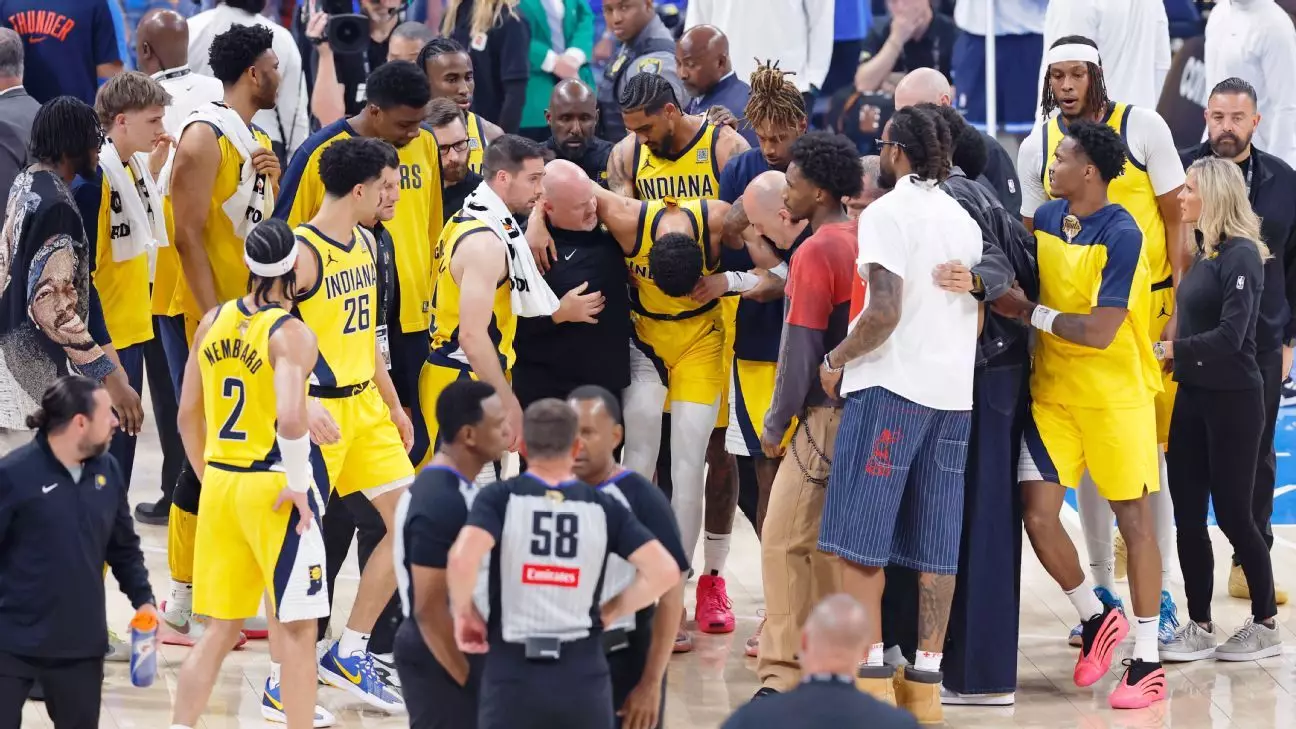For athletes, the drive to push through pain is an almost sacred mantra, a testament to the undying spirit that fuels competition. The Indiana Pacers’ star guard, Tyrese Haliburton, embodied this ethos when he chose to play through a calf strain that ultimately led to a devastating Achilles tear during Game 7 of the NBA Finals. His recent social media reflection reveals a heart full of pride moored in disappointment, illustrating a vital, often overlooked battleground—the intersection of mental fortitude and physical vulnerability.
Haliburton’s poignant declaration—“I’d do it again, and again after that, to fight for this city and my brothers”—exemplifies a fierce loyalty that resonates profoundly within professional sports. The narrative he presents is not merely one of injury; it is the embodiment of a committed athlete ready to sacrifice personal well-being for the sake of a greater cause. This selflessness, however admirable, invites scrutiny: Should athletes be so willing to jeopardize their physical health for the sake of the game? The competitive fervor in sports often glorifies pain and endurance, misconstruing injury as an honorable badge rather than a legitimate concern.
The Cost of Glory
As the echoes of his dramatic season reverberate throughout sports media, Haliburton’s emotional outpouring culminates in both despair and defiance. Describing the moment of injury—“crumpled to the floor on an attempted drive to the basket”—forces fans to confront the precariousness of athleticism. This visceral image exemplifies the fragility of an athlete’s career; it emphasizes that one moment can erase the dreams cultivated over years of perseverance and hard work.
His acknowledgment of the “pain of this letdown” unveils a facet of sports that often remains hidden: the psychological toll of injury. Haliburton’s raw vulnerability as he shares his struggles illustrates the profound sense of loss that accompanies such an injury. It is not just the physical setback; it’s a detachment from a narrative in which he had begun to carve his legacy. The burden rests not only on the body but also on the psyche. How does one reconcile the soaring highs of success with the crushing lows of physical incapacity? Haliburton’s reflections encapsulate this inner turmoil, serving as a poignant reminder that athletes are not invincible.
The Burden of Expectations
Haliburton is now among the latest casualties of the ruthless physical demands of basketball, joining other stars like Damian Lillard and Jayson Tatum in the tragic fraternity of torn Achilles injuries. These occurrences highlight an unsettling truth: elite-level competition pressures athletes to overlook their limits in pursuit of victory. The pressure to perform can warp perceptions of risk, leading to detrimental choices that may easily sabotage careers.
In a professional environment where cliches abound, Haliburton’s sarcastic dismissal of platitudes such as “you’ll come back stronger” reflects a genuine frustration with hollow reassurances that fail to address the complexities of recovery. The pity-sandwich offered by well-meaning fans can often feel like salt in the wound, as the enormity of his journey unfolds before him. The mental resilience he mentions is essential not just for his physical rehabilitation, but for coping with lost opportunities.
A Call for Change
While Haliburton’s journey showcases monumental grit, it also serves as a clarion call for a cultural shift within professional sports. There must be a transition toward valuing athlete health over merely glorifying their sacrifices. As fans, we should question the implications of an industry that promotes this mentality of valorization linked with injury. The tragic irony lies in the very fact that fans idolize these athletes for their toughness, yet often fail to recognize the significance of self-preservation.
Haliburton’s heartfelt transparency challenges us to rethink the glorification of a “play through the pain” mentality. In an industry so deeply tied to performance and success, we must prioritize athlete welfare and advocate for systemic changes that allow players to prioritize their health without fear of judgment. Injury rehabilitation should be viewed through a lens of strength and recovery—a testament to resilience, rather than a narrative of failure.
Through Haliburton’s emotional declaration, we find not just a story of personal struggle, but an opportunity to redefine the landscape of sports culture—one that honors the humanness at the core of athleticism.

